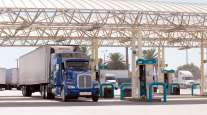pennlive.com
Pennsylvania Truckers Object to Proposed Doubling of Registration Fee

[Stay on top of transportation news: Get TTNews in your inbox.]
A mileage-based user fee, package delivery fee and a toll to use limited-access lanes are among the new revenue options a governor-appointed panel is making to meet Pennsylvania’s transportation funding needs going forward.
The options also include a doubling of vehicle registration fees that a trucking leader said would result in interstate trucking companies registering their trucks in other states.
No doubt the ideas the Transportation Revenue Options Commission (TROC) came up with will spark lively debate within the General Assembly but in the eyes of state Transportation Secretary Yassmin Gramian, who chaired the commission, they are 21st century solutions to help close a $9.25 billion a year funding gap that grows wider by the year.
The 49-member commission met virtually July 28 to do a walk-through of a final draft of their report due to Gov. Tom Wolf by Aug. 1.
Wolf charged the commission to come up with ideas to phase out the state’s gas tax — around 53 cents a gallon, the second-highest in the nation. PennDOT relies on that tax to fund 78% of its revenue needs, far more by percentage than neighboring states.
With people driving less during the pandemic and some driving more fuel-efficient cars or electric vehicles, PennDOT officials say this tax no longer is able to generate the money that is needed to keep the state’s transportation network in good repair.
Making that even more challenging is the cost of materials needed for transportation projects is continually rising, driving the need for immediate action to address PennDOT’s funding gap, said Chuck Zimmerman, PennDOT’s director of fiscal management.
With that in mind, the commission proposed phasing in over five years:
- an 8.1-cent-per-mile user fee;
- doubling the state’s vehicle registration fee;
- a higher sales tax on vehicle purchases;
- an electric car fee, and
- among others, a goods delivery fee — under consideration in Denver and New York City — to take advantage of the public’s shift to buying products online and having them delivered to their home by trucks that put stress on roads and bridges.
Rebecca Oyler, president of the Pennsylvania Motor Truck Association, said the trucking industry would oppose the proposed doubling of vehicle registration fees, which will make the commonwealth have the second-highest truck registration fee in the nation.
“This will absolutely cause interstate trucking companies to register their trucks elsewhere and in-state trucking companies, the vast majority of which are small businesses, will deal with drastic cost increases,” she said. “Those cost increases are going to have real impacts on businesses and jobs.”
PMTA Responds to TROC Report
“PMTA is disappointed to see the final report essentially recommends ‘all of the above,’ without weighing the unintended consequences of many of these increases, particularly for commercial motor vehicles."https://t.co/MYHcpNzpJB — PMTA (@P_M_T_A) July 29, 2021
Gramian called on the commission members to continue the conversation in advancing their recommendations with the “same vigor and passion” as they exhibited in developing them. That includes engaging with the public, transportation interest groups and lawmakers over the next six months to fine-tune them.
“We need to adhere to a six-month timeline for acting on TROC’s proposal,” she said. “It should commence at the time of the governor’s budget presentation in February 2022 with the goal of acting on it by July 1, 2022.”
She referred to the report as a starting point for conversations, but it’s clear from the discussion during the commission’s meeting that those conversations will begin with some hesitation and even resistance from some of its members.
Rep. Tim Hennessey (R-Chester County) said conservative lawmakers are going to want to see how PennDOT has looked inward at cutting out waste before they are willing to consider any kind of a tax or fee increase on motorists.
Gene Barr, president and CEO of the Pennsylvania Chamber of Business and Industry, told the Associated Press that the business-to-business taxes or fees being contemplated in the commission’s report could hurt the state’s economy and startup businesses.
Others pointed out there are other transportation funding ideas being considered by the General Assembly as well as in Congress that could alter how much new revenue might be needed.
EARLIER: Pennsylvania considers package fee to pay for roads, bridges
Leeann Sherman from the American Council of Engineering Companies of Pennsylvania said she hopes the report, with a push from commission members, pushes policymakers to arrive at a final solution to Pennsylvania’s transportation funding needs.
“We can’t please everyone so there’s going to be some things that aren’t easy to do, but those hard conversations are going to need to come from the leadership as well as the support from us,” she said.
Mark Compton, CEO of the Pennsylvania Turnpike, said the key to achieving major sea changes such as a mileage-based user fee in the General Assembly is to keep the conversation alive about the new transportation funding themes raised in the report.
“So our job, as I see it, is to make sure that we continue to make transportation a No. 1 priority,” Compton said. He said commission members should focus on the themes in those conversations and “let those that have to vote and those that have to sign the bill determine the levels [of fees and taxes],”
Gramian closed out the commission’s final meeting by committing to work with the governor’s office, legislative leaders and stakeholders to advance the options in the report.
“The next few months will be a time that calls for a unity of purpose,” she said. “As transportation leaders, we are called to join together to solve this problem and solve it well.”
Want more news? Listen to today's daily briefing below or go here for more info:
Distributed by Tribune Content Agency, LLC




